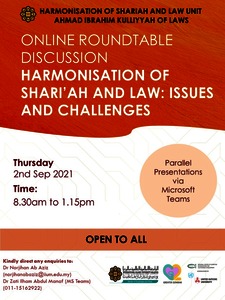Jahn Kassim, Puteri Nemie (2021) Contemporary issues in Malaysian medical law: harmonising the common law with local specificities. In: Harmonisation of Shari'ah and Law: Issues and Challenges (Online Roundtable Discussion), 02 September 2021, Virtual. (Unpublished)
|
PDF
Download (1MB) | Preview |
|
![[img]](http://irep.iium.edu.my/91901/2.hassmallThumbnailVersion/RTD%20poster.jpeg)
|
PDF
Download (218kB) | Preview |
|
|
PDF
Download (112kB) | Preview |
Abstract
The development of Medical Law in Malaysia has become much more prominent in the last ten years due to the increasing judicial intervention in various aspects of medical practice. Medical Law is undoubtedly a challenging legal area as it draws on a wide range of existing legal subjects including tort law, criminal law, family law and contract law. The intervention of law in this area has profoundly altered the legal boundaries of what are considered acceptable conducts in issues relating to medical negligence, consent to medical treatment, organ transplant, abortion, sterilisation and euthanasia. Although the law being an instrument of social regulation seeking to regulate behaviour within the society, protecting rights as well as reflecting society values, the intervention of law in the area of medicine has raised difficult legal problems due to the existence of ethical, philosophical and religious dilemmas. In view of section 3 of the Malaysian Civil Law Act 1956 which provides that unless there is any written law in force in Malaysia, the courts in Malaysia shall apply the common law of England and the rules of equity as administered in England on 7 April 1956, the English common law has been a predominant source in the development of Medical Law in Malaysia due to the absence of clear and specific legislations. However, the application of the said common law and the rules of equity should only be applied if the local circumstances render it to be necessary and does not violate the religious and cultural sensitivities of the Malaysian population. Thus, judicial intervention in the development of the Malaysian Medical Law in the twentieth century should adopt a holistic approach in harmonising the salient principles in the English common law with the existing religious and cultural traditions of the Malaysian population in regulating fundamental issues affecting a person’s health and well-being.
| Item Type: | Proceeding Paper (Slide Presentation) |
|---|---|
| Subjects: | K Law > K Law (General) |
| Kulliyyahs/Centres/Divisions/Institutes (Can select more than one option. Press CONTROL button): | Ahmad Ibrahim Kulliyyah of Laws Ahmad Ibrahim Kulliyyah of Laws > Department of Civil Law |
| Depositing User: | Professor Dr Puteri Nemie Jahn Kassim |
| Date Deposited: | 08 Sep 2021 08:47 |
| Last Modified: | 31 Mar 2022 14:41 |
| URI: | http://irep.iium.edu.my/id/eprint/91901 |
Actions (login required)
 |
View Item |


 Download Statistics
Download Statistics Download Statistics
Download Statistics